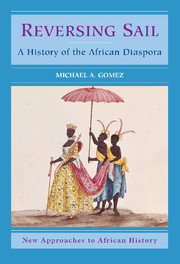4 - Transatlantic Moment
Summary
European engagement with the Muslim world contributed to a cultural awakening and commercial expansion resulting in profound political transformations. An energetic Europe burst upon the world scene in the fifteenth century, ushering in a new era. Labor exploitation was key to the expansion, and critical to such labor was the capture and enslavement of Africans. African captives in the Muslim world were important and numerically significant, but the transatlantic trade was exceptional for its high volume and compact duration, with the overwhelming majority of Africans transported in the eighteenth and nineteenth centuries. The consequences for Africa and its exported daughters and sons were catastrophic.
Like the inner workings of a clock, the interconnectedness of several global developments gave rise to the transatlantic slave trade. Christian–Muslim conflict, international commerce, sugar, and New World incursions were foremost in creating circumstances whereby the African emerged as principal source of servile labor, laying the foundations of the modern world.
Reconquista
Muslim forces in al-Andalus, never in control of the entire Iberian peninsula, were continually threatened by Christian enemies during their nearly 800-year rule. The latter stages of the struggle for Iberia, referred to as the “reconquest” by the Christians, unfolded at the same time as an equally momentous contest between Christian and Muslim powers raging near the Black Sea. There, Muslims fought for control of the old Byzantine or eastern Roman empire (referred to by the Muslims as Rūm).
- Type
- Chapter
- Information
- Reversing SailA History of the African Diaspora, pp. 59 - 81Publisher: Cambridge University PressPrint publication year: 2004



